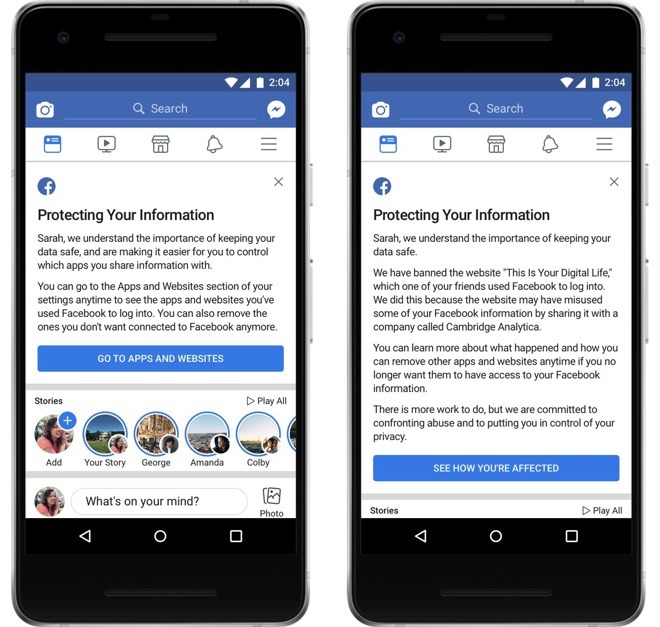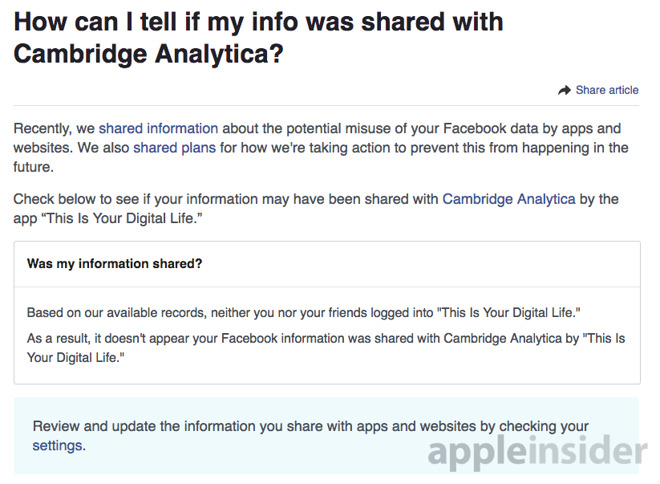How to check if Facebook gave your data to Cambridge Analytica right now
This week, Facebook has started to alert the estimated 87 million users affected by the Cambridge Analytica scandal, advising in the News Feed if personal data for an account was obtained by the company. For users of the social network who haven't yet seen a notification, there is a second way to manually check if their privacy was violated as part of the affair.

The main way users will find out if their details were acquired by Cambridge Analytica will be via a privacy warning at the top of their News Feed. For those affected, the notice explains the banning of the website "This Is Your Digital Life," which was used to capture user data, and was then provided to the political analysis firm, with the warning provided to those who used the site as well as friends and acquaintances who may also have been victim by proxy.
For other users unaffected by the event at all, the notice instead provides more general guidance for checking apps and websites that have access to their Facebook data.

As the notice will be slowly rolling out to users, with users in the UK starting to receive their notifications ahead of other countries, it may take some time before everyone who uses Facebook will find out if their personal data was shared via this method. The alternative way is to visit Facebook's support page titled "How can I tell if my info was shared with Cambridge Analytica?" which will provide a more immediate answer.
On that page, a box labeled "Was my information shared?" will display the results for the currently logged-in user. The contents of the box will change depending on if the user accessed the banned site, if their friends logged in, or if their data is safe.

In each case where some data was accessed, Facebook advises the type of content that was "likely shared" with the banned service. In cases where data was shared, Facebook advises this will include the public profile, page likes, birthday, and their current city.
Facebook also warns that a small number of users who logged into "This Is Your Digital Life" also shared their News Feed, timeline, posts, and messages, which may include posts and messages from friends. It is advised for all users, regardless of whether or not their data was involved in the Cambridge Analytica affair, to review and update the information they share with third-party services by checking their account settings.
AppleInsider has also produced a guide for reducing the amount of private information available on accounts, minimizing the data that could be acquired by analytical firms in the future.

The main way users will find out if their details were acquired by Cambridge Analytica will be via a privacy warning at the top of their News Feed. For those affected, the notice explains the banning of the website "This Is Your Digital Life," which was used to capture user data, and was then provided to the political analysis firm, with the warning provided to those who used the site as well as friends and acquaintances who may also have been victim by proxy.
For other users unaffected by the event at all, the notice instead provides more general guidance for checking apps and websites that have access to their Facebook data.

As the notice will be slowly rolling out to users, with users in the UK starting to receive their notifications ahead of other countries, it may take some time before everyone who uses Facebook will find out if their personal data was shared via this method. The alternative way is to visit Facebook's support page titled "How can I tell if my info was shared with Cambridge Analytica?" which will provide a more immediate answer.
On that page, a box labeled "Was my information shared?" will display the results for the currently logged-in user. The contents of the box will change depending on if the user accessed the banned site, if their friends logged in, or if their data is safe.

In each case where some data was accessed, Facebook advises the type of content that was "likely shared" with the banned service. In cases where data was shared, Facebook advises this will include the public profile, page likes, birthday, and their current city.
Facebook also warns that a small number of users who logged into "This Is Your Digital Life" also shared their News Feed, timeline, posts, and messages, which may include posts and messages from friends. It is advised for all users, regardless of whether or not their data was involved in the Cambridge Analytica affair, to review and update the information they share with third-party services by checking their account settings.
AppleInsider has also produced a guide for reducing the amount of private information available on accounts, minimizing the data that could be acquired by analytical firms in the future.

Comments
Incidentally, I've tried the app and website and neither are showing any privacy messages for me. Maybe my 1-facebook-post-per-year average isn't worth much on the open market.
...it doesn't appear your Facebook information was shared with Cambridge Analytica..."
I find that hard to believe give the app activity of some of my friends. I've never used any apps and block any that I received invites from. I've taken what I believe to be reasonable steps to protect my privacy over the last decade on Facebook.
If a friend of yours used the app then it plumbed his Facebook friends and found this you. Then Facebook handed over your details without telling you.
(deletion was coincidental to the CA thing, I did it the day before the news broke)
(Ray is right; Wikipedia: “The data about the 50 million Facebook users were acquired from 270,000 Facebook users who shared the data with the app ‘thisisyourdigitallife’.”)
From the Facebook Support site...
A boring existence has its benefits.
This is normal operation for Facebook. The only thing different in this case is the timing and the who. It doesn't have to turn into a political debate, but I'm getting kind of sick of all the media hoopla over this as if it's some big deal all of a sudden.
I'm glad people are finally waking up... it's the context that bothers me. The article, for example, says nothing about how to check if our data was used by a zillion other organizations (including ones that shall not be named in the interest of not getting political, apparently).
On the one hand, I'm grateful to AI for the technical information, but by highlighting this along with the rest of the media, you're participating in the political aspect too, whether you like it or not (unless you disclose the type of stuff I and others have been attempting to disclose).